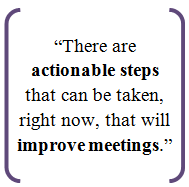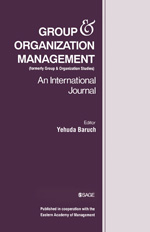Make Your Meetings a Tool for Engagement
Editor’s note: We are pleased to welcome Dr. Joseph A. Allen of the University of Nebraska at Omaha. He and Dr. Steven G. Rogelberg of the University of North Carolina at Charlotte published the article, “Manager-Led Group Meetings: A Context for Promoting Employee Engagement,” forthcoming in Group & Organization Management and now available in the journal’s OnlineFirst section.
 Meetings stink! Let’s face it. Most people agree that meetings in their organization are less than effective. There’s a growing body of research that corroborates these reports. However, very little research scientifically investigates how to make meetings better. We became interested in this particular topic because we hated our meetings and wanted to figure out how to make them better. In fact, we wanted to know if there are things that managers can do to not only make meetings better, but actually engage employees. In essence the question that drove this study was “how can a meeting leader (often the manager) make their meetings a tool to engage employees?”
Meetings stink! Let’s face it. Most people agree that meetings in their organization are less than effective. There’s a growing body of research that corroborates these reports. However, very little research scientifically investigates how to make meetings better. We became interested in this particular topic because we hated our meetings and wanted to figure out how to make them better. In fact, we wanted to know if there are things that managers can do to not only make meetings better, but actually engage employees. In essence the question that drove this study was “how can a meeting leader (often the manager) make their meetings a tool to engage employees?”
 The study presented in this paper suggests three key things that a manager can do to make their meetings a tool for engaging employees: 1. Make the meetings relevant to attendees, 2. Allow for voice opportunities during the meeting, and 3. Run the meetings effectively from a time management perspective. What really surprised us was just how powerful the third suggestion, meeting time management, appeared to be at developing the psychological conditions for employees to engage. It related to all three psychological conditions! In other words, if managers were to just pick one of the three suggestions to focus on, it appears as though starting meetings on time, ending them on time, and calling them at appropriate times is the way to go.
The study presented in this paper suggests three key things that a manager can do to make their meetings a tool for engaging employees: 1. Make the meetings relevant to attendees, 2. Allow for voice opportunities during the meeting, and 3. Run the meetings effectively from a time management perspective. What really surprised us was just how powerful the third suggestion, meeting time management, appeared to be at developing the psychological conditions for employees to engage. It related to all three psychological conditions! In other words, if managers were to just pick one of the three suggestions to focus on, it appears as though starting meetings on time, ending them on time, and calling them at appropriate times is the way to go.
Our hope is that this study will influence both the research of meetings and managers behaviors in relation to meetings. Ideally, academics will use this as a springboard to investigate meetings from a more positive perspective. If we can dispel the frustration towards meetings by showing that they truly matter when run effectively, then perhaps the normative expression that meetings are bad will begin to change over time. Further, managers can easily implement many of the suggestions provided in this paper. Thus, there are actionable steps that can be taken, right now, that will improve meetings and our hope is that a few managers will see this paper or this blog post and make their meetings a tool for engagement.
Read the paper, “Manager-Led Group Meetings: A Context for Promoting Employee Engagement,” online in Group & Organization Management.
Joseph A. Allen, PhD, is Assistant Professor in the Department of Psychology at the University of Nebraska at Omaha. His publications include his work on workplace meetings, volunteer management, and emotional labor. Further research interests include cross-cultural differences in emotions and interaction processes as well as an interest in after-action review meetings in high reliability contexts.
Steven G. Rogelberg, PhD, is a professor of organizational science, a professor of psychology, and a professor of management at the University of North Carolina at Charlotte. In addition, he serves as director of the organizational science program, the founder/ director of the organizational science consulting and research unit, and the editor of the Journal of Business and Psychology. His publications include such topics as dirty work, workplace meetings, volunteer management, research methods, and group dynamics.































































































